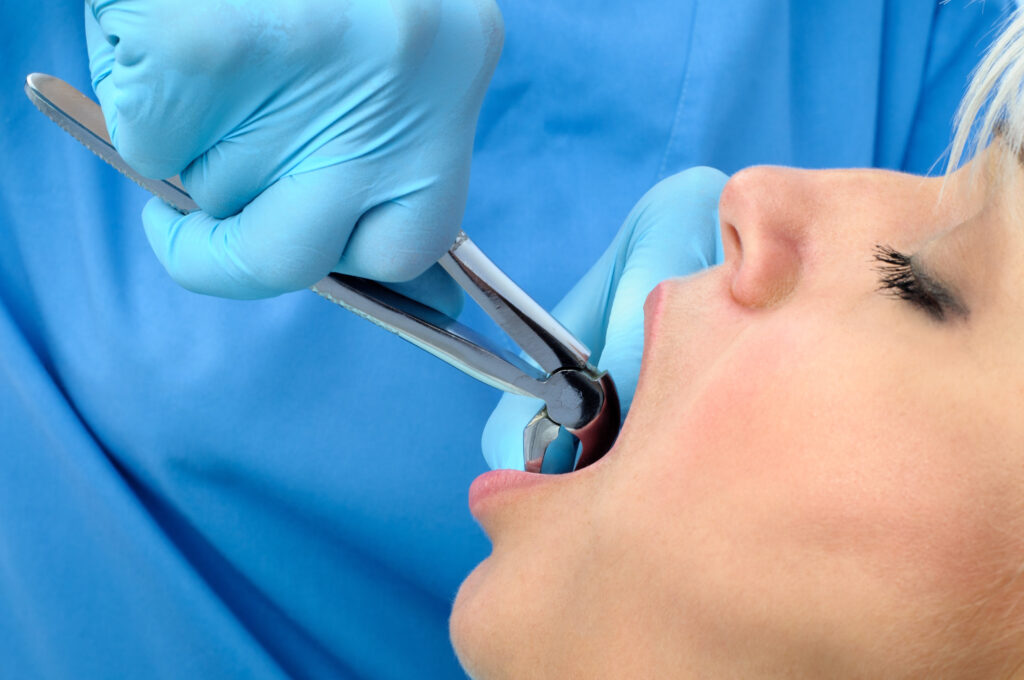Dental professionals frequently perform tooth extractions, which involve extracting a tooth from its position in the jawbone. There are several reasons why a tooth may need to be extracted, including decay, infection, damage, or overcrowding. In some cases, wisdom teeth may also need to be removed to prevent potential dental problems. In this article, we will discuss tooth extractions in detail, including the procedure, recovery, and aftercare.
Procedure
 Before the tooth extraction procedure, your dentist will numb the area around the tooth using a local anesthetic. This will ensure that you don’t feel any pain during the procedure. In some cases, the dentist may even recommend sedation to help you relax during the process.
Before the tooth extraction procedure, your dentist will numb the area around the tooth using a local anesthetic. This will ensure that you don’t feel any pain during the procedure. In some cases, the dentist may even recommend sedation to help you relax during the process.
Once the area is numb, the dentist will use a special tool to loosen the tooth from its socket. They will then use forceps to gently remove the tooth from the socket. In some cases, the tooth may even need to be divided into smaller parts before it can be extracted.
After the tooth has been removed, the dentist will place gauze over the socket and ask you to bite down to help stop the bleeding. In some cases, they may also stitch the area to help it heal.
Although not everyone needs to have their wisdom teeth removed, in some cases wisdom tooth extraction may be necessary to prevent dental problems and alleviate discomfort. While the thought of undergoing a wisdom tooth extraction can be daunting, it’s essential to know that there are skilled dentists who can perform the procedure with minimal pain and discomfort. For example, at Thomas Matic Pty Ltd, Dr. Matic and his staff have helped hundreds of individuals with an affordable, gentle service for the removal and management of their wisdom teeth.
Recovery
After the tooth extraction procedure, it is normal to experience some pain and swelling in the area. Your dentist may prescribe pain medication to help you manage any pain or discomfort. It is also important to avoid smoking, using a straw, or eating hard, crunchy, or sticky foods for the first few days after the procedure.
To promote healing, it is equally important to keep the extraction site clean. Your dentist will provide you with clear instructions on how to do this, but in general, you should avoid brushing or rinsing the area for the first 24 hours. After this time, you can gently rinse your mouth with salt water to help reduce swelling and prevent infection.
It is also crucial to rest and avoid any strenuous activity for the first few days after the procedure. You may also need to take some time off work or school to allow your body to heal.
Aftercare
 After a tooth extraction, it is vital to follow your dentist’s instructions for aftercare to ensure proper healing. This may include taking prescribed medications, avoiding certain foods, and maintaining good oral hygiene practices.
After a tooth extraction, it is vital to follow your dentist’s instructions for aftercare to ensure proper healing. This may include taking prescribed medications, avoiding certain foods, and maintaining good oral hygiene practices.
Some additional aftercare tips include:
- You can use an ice pack and apply it to the affected area for around 20 minutes at a time to help reduce swelling.
- Keep away from smoking or using tobacco products for at least 24 hours after the procedure.
- Avoid consuming alcohol for at least 24 hours after the procedure.
- Eat soft, nutritious foods such as yogurt, mashed potatoes, and soup for the first few days after the procedure.
- Do not use a straw, as the suction can dislodge the blood clot and delay the healing procedure.
In some cases, your dentist may also recommend additional treatments or procedures to help facilitate healing or prevent future dental problems.
Conclusion
Tooth extractions are a very common dental procedure that may be necessary to prevent dental problems or alleviate discomfort. Although the mere thought of having a tooth removed may be frustrating, the procedure is generally straightforward and relatively painless. With proper aftercare, most patients can expect to make a full recovery within a few days to a week after the procedure. If you have any questions or concerns about tooth extractions, be sure to contact Thomas Matic Pty Ltd!


